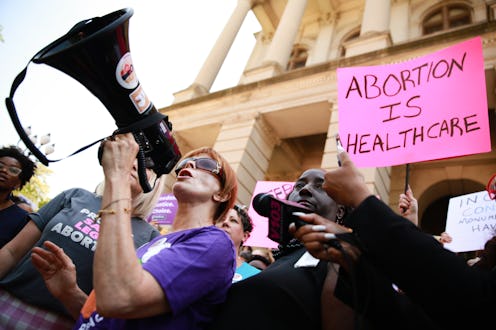News
Attorneys General Across The US Are Taking A Bold Stand Against State Abortion Bans

Following recent abortion bans that have been sweeping the country, at least 12 attorneys general will refuse to criminalize abortion, according to a joint statement they issued this week. Attorneys general from 11 states and the District of Columbia signed a joint statement this week pledging not to prosecute abortion cases, per The Hill, noting that abortion bans like those in Alabama, Missouri, and Georgia "appear to be unconstitutional."
"As some elected prosecutors have noted, the broad restrictions in the laws passed by these states appear to be unconstitutional under Roe v. Wade," the joint statement reads. "What brings us together is our view that as prosecutors we should not and will not criminalize healthcare decisions such as these — and we believe it is our obligation as elected prosecutors charged with protecting the health and safety of all members of our community to make our views clear."
Attorneys general from California, Vermont, Minnesota, Nevada, Maryland, Massachusetts, Delaware, Illinois, Michigan, Oregon, Pennsylvania, and the District of Columbia all signed the statement, along with 30 city and district attorneys from these and other states. Not all of these prosecutors are from states affected by recently passed abortion bans, the statement noted, but they all nonetheless made a commitment to "use our discretion to decline to prosecute personal healthcare choices criminalized under such laws."
The prosecutors who signed the statement also noted that many of the recent abortion bans are so broad that a people with varying degrees of proximity to an abortion procedure could be implicated.
"Doctors, nurses, anesthetists, health care providers, office receptionists — virtually anyone who either performs or assists in performing or arranging what is currently a legal medical procedure based on precedent for almost a half century — and in some states, even the patient herself, could face criminal liability under these statutes," the statement argued.
This is not the first step that prosecutors have taken to push back on abortion bans. When Georgia Gov. Brian Kemp signed a so-called "heartbeat" abortion bill into law last month, four district attorneys from the state's most populous counties told the Associated Press that they wouldn't enforce the ban at all. And when Utah Gov. Gary Herbert signed an 18-week abortion ban back in March, District Attorney Sim Gill — the chief prosecutor in a county where both of Utah's abortion clinics are located — refused to "serve as an enforcement mechanism for what is a facially unconstitutional law."
This week's joint statement was issued by an advocacy group called Fair and Just Prosecution, and also contained commentary about the criminal justice system's limited resources.
"We believe that the wise use of discretion requires balancing these limited resources, while meeting the safety needs of our communities," the statement read. "In our view, resources are better utilized to prevent and address serious crimes that impact our community rather than enforcing laws such as these that divide our community, create untenable choices for women and healthcare providers, and erode trust in the justice system."
Multiple states have passed six-week abortion bans in recent weeks — and Alabama's ban notably does not contain exceptions for rape or incest, causing prominent Republicans like President Donald Trump to distance themselves from the law. However, Alabama and other states that have recently passed abortion bans are already facing legal challenges — and the prosecutors who signed this week's joint statement may pose an additional challenge to conservative lawmakers' anti-abortion legislation.